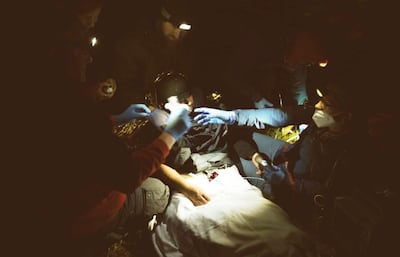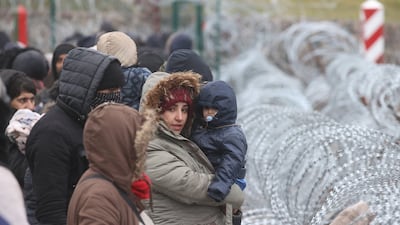For one Polish activist who has sought to provide support for stranded migrants along the country’s border with Belarus, despair is rising as there are too few volunteers to help more than 3,000 stranded people.
''People seem not to care that much about children dying in the woods,” Grzegorz, an organiser with the Polish humanitarian group Granica (The Border), tells The National.
''With freezing temperatures ahead, the worst sights are yet to come. They can't go anywhere. Polish authorities do not feel obliged to provide these refugees with shelter or any kind of help.”
Granica and other groups like Medycy na Granicy (Medics at the Border) are struggling not only with immediate needs on the ground but the martial response of the Warsaw government, which has mobilised the army to seal its frontier.

An umbrella group of 14 social organisations and activists working for human rights is appealing to the Polish government to create a humanitarian bridge for the thousands trapped at the border. It says they are not aggressors but pawns being used by Belarus.
“We remind all parties that migrants are not aggressors but hostages of [President Alexander] Lukashenko’s regime,” wrote the group.
With aid agencies and even volunteer medics forbidden from the Polish exclusion zone, the local community have in some cases stepped in to help migrants on the Polish side of the border.
The Green Light campaign, launched a few weeks ago, gives locals simple instructions: those living along the Poland-Belarus border, and elsewhere, who are willing to help migrants and refugees crossing the border are asked to put a green light in a window or above their front door.
A 15-minute film on YouTube about the work local activists and volunteers are doing in Poland, which has been viewed over 40,000 times, pieces together a picture of the dire situation for migrants there.
Kamil Syller, founder of the Green Light campaign and a lawyer living four kilometres from the border, says a lot of rumours have left him deeply concerned about conditions in the forests.
“We don’t know if the information about dozens of bodies lying there is true, because no one has seen them, no one can go”, he says in the video.
Another member of the local community who has been giving food and water to migrants asks wearily: “How many times can people do this type of ping-pong?”
Others describe finding people on the streets severely dehydrated and kneeling before them when they were given water to drink. This front-line exposure to the crisis has been traumatising for many, particularly when the sociopolitical climate paints those who help migrants as criminals.
As international leaders discuss ways to resolve the migrant crisis at the border of Poland and Belarus, the lives of those camping in freezing conditions outdoors remain at stake, and it is the local community that is stepping in to save them.
Having declared a state of emergency around a three-kilometre exclusion zone in September, Poland has effectively barred NGOs, journalists and non-residents from accessing the forested area. Under difficult and often risky circumstances, activists and volunteers have been supplying any people they find with basics like water, blankets and food.
“Every day, I hear stories of terror, violence, repression towards refugees,” says Sanna Figlarowicz, a Polish volunteer who has been messaging several different migrants in the forest for weeks. She spends a lot of her time archiving and documenting information she receives, though most of her time is spent worrying about the people she believes are particularly vulnerable.
In October, the Polish parliament passed a new law authorising border guards to push back and expel illegal migrants, despite international obligations to give protection to asylum seekers, even if they have crossed a border illegally.
Human rights organisations are alarmed about the consequences for migrants.

“Other activists tell horrifying stories about Belarusian border guards who were forcing them into deep rivers and then pushing them out of the forests straight into the cold and rain,” Grzegorz tells The National.
“The KGB will not hesitate to spray pepper gas into children's faces to manipulate our attitudes. People are being tortured yet Poland and Brussels [the EU] are doing nothing to help them.”
While no green lights were on in the houses in Sokolka, a town some 20km away from the border with Belarus, residents there are nevertheless alert and sensitive. The National spoke to one man who saw a group of hungry refugees trying to enter one of the houses in Malawicze Gorne, a settlement near Kuznica.
''One of the men broke the window in my friend's house and asked for some food''.
Grzegorz says similar testimonies are rare and that none of the migrants the activists have helped have been armed.
''These people are not groups of thugs who came here to attack the Polish border. The only thing they want is to ward off the cold. To eat.''
Sokolka inhabitants do not seem too frightened of the situation, although they see military cars or police vans flashing blue lights as they head at high speeds towards the border.
''We'll see what will happen. The politicians talked about every scenario so we are also prepared,” a local woman told The National.
The official humanitarian response has yet to come. Some commentators say that Poland's answer to the migrant issue may further define the country's moral compass: whether it will cringe with shame or come out of the crisis triumphant.

